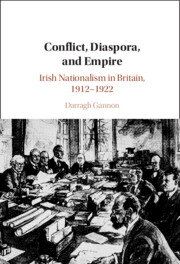Book contents
- Conflict, Diaspora, and Empire
- Conflict, Diaspora, and Empire
- Copyright page
- Contents
- Acknowledgements
- Introduction
- 1 Nationalists, Separatists, and the British Political Maze
- 2 Volunteers, War, and Rebellion
- 3 Nationalists, Republicans, and the Politics of War
- 4 Democracy, Citizenship, and the Irish National Ideal
- 5 Arms, Conflict, and Post-War Violence
- Conclusion
- Index
4 - Democracy, Citizenship, and the Irish National Ideal
Published online by Cambridge University Press: 15 June 2023
- Conflict, Diaspora, and Empire
- Conflict, Diaspora, and Empire
- Copyright page
- Contents
- Acknowledgements
- Introduction
- 1 Nationalists, Separatists, and the British Political Maze
- 2 Volunteers, War, and Rebellion
- 3 Nationalists, Republicans, and the Politics of War
- 4 Democracy, Citizenship, and the Irish National Ideal
- 5 Arms, Conflict, and Post-War Violence
- Conclusion
- Index
Summary
Chapter four examines the political effects of Irish republican publicity campaigns in Britain on the British-Irish propaganda war between January 1919 and July 1921. It profiles the political languages and cultures of Irish republican-inspired organisations; assesses the publicity campaigns of the I.S.D.L. in British cities; and evaluates the import of Sinn Féin propaganda on British political opinion. In the absence of Sinn Féin representation at Westminster, this chapter submits, the responsibility of cultivating British public opinion rested heavily on Irish nationalist organisations in British centres. The I.S.D.L. and Sinn Féin, however, were fundamentally apolitical movements who failed to acknowledge their responsibility as de facto Irish political parties in Britain. The coordination of mass demonstrations, and cultivation of post-war political discourses, re-cast the I.S.D.L. and Sinn Féin as political associations with which the Irish ethnic group increasingly identified, as the War of Independence intensified. While they failed to establish the same level of ‘social esteem’ as the Irish Party in British political culture, Irish nationalist associations became the target of British state censorship and repression. In the war of words for British public opinion, consequently, the I.S.D.L. and Sinn Féin were recognised by British policy makers at Whitehall as prolific propagandists.
Keywords
- Type
- Chapter
- Information
- Conflict, Diaspora, and EmpireIrish Nationalism in Britain, 1912–1922, pp. 159 - 211Publisher: Cambridge University PressPrint publication year: 2023



